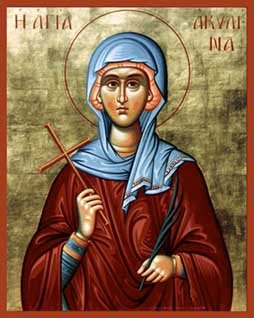|
|||
|---|---|---|---|
| This weekly bulletin insert complements the curriculum published by the Department of Christian Education of the Orthodox Church in America. This and many other Christian Education resources are available at http://dce.oca.org. | |||

Saint Aquilina lived for only twelve years and came from Byblos, a town in Palestine. Even as a little girl, Aquilina felt a profound closeness to Jesus Christ. By the time she was ten she preached powerfully, thrilling her friends with descriptions of the beauty and glory of the Kingdom, and speaking with conviction about Christ's miracles and His care for the destitute. Aquilina's youth was no protection against arrest by those in power who viewed Christianity as a threat to proper veneration of the gods and the emperor. She was brought before the governor Volusianus. He is described, in traditional Christian sources, as "more like a beast than a man," so he must have been especially intimidating to this very young girl. Knowing that she would face extremes of pain at the hands of a hater of Christ, Aquilina prayed for strength and support in this time of trouble. She refused to be silent about her love for Christ, and for this she was tortured so brutally that she collapsed. Volusianus believed she was dead, and ordered her body to be discarded in a field without ceremony. But Aquilina continued to pray, asking that she be allowed to have a martyr's death. An angel appeared to her, and a heavenly voice told her that it would be as she wished. She rose, and walked to the governor's palace. There she appeared, a kind of ghostly figure, before Volusianus as he lay in bed. The terrified governor immediately ordered that she be beheaded. The next day, before losing her life, the twelve-year-old Aquilina peacefully surrendered her spirit to God. The "Akathist to Almighty God for Help in Trouble" (printed in an attractive, readable format by St. Paisius Orthodox Monastery, with the permission of Priest Gregory Williams of the St. John of Kronstadt Press) is an excellent prayer resource for our own times of trouble. The verses acknowledge that we are sinful creatures, but also remind us that our Creator has exalted us in many ways. For example, the gift of human speech is compared with God's Creation in this way: "O Lord, my Lord, by whose Word the heavens have been established, make me steadfast in the confession of Thy holy name." Another comparison asks God to grant the kind of courage that saints like Aquilina showed: "O Lord, my Lord, who didst fill the martyrs with boldness when they stood before the tribunals, grant me boldly to stand against sin, the world and the devil."
Father Demetrios Carellas, in an introduction, suggests using the Akathist in personal prayer. He recommends reading it frequently, first as "maintenance medication" against the passions we encounter daily. In addition, familiarity with the words will enable us to "build up a stockpile of 'spiritual ammunition,' from which we can receive additional courage when we are faced with a major crisis or definite demonic attack." We can be thankful for saints like Aquilina, and also for prayers like this Akathist that help us try to emulate them. |
|||
